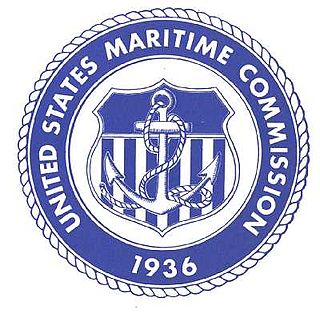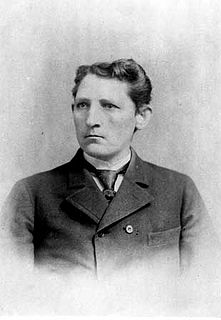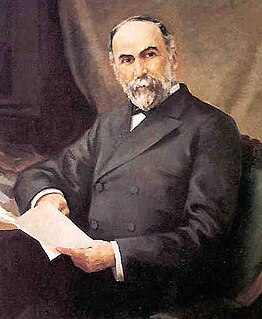Related Research Articles

The United States Merchant Marine refers to either United States civilian mariners, or to U.S. civilian and federally owned merchant vessels. Both the civilian mariners and the merchant vessels are managed by a combination of the government and private sectors, and engage in commerce or transportation of goods and services in and out of the navigable waters of the United States. The Merchant Marine primarily transports cargo and passengers during peacetime; in times of war, the Merchant Marine can be an auxiliary to the United States Navy, and can be called upon to deliver military personnel and materiel for the military. Merchant Marine officers may also be commissioned as military officers by the Department of Defense. This is commonly achieved by commissioning unlimited tonnage Merchant Marine officers as Strategic Sealift Officers in the United States Navy Reserve.

Shanghaiing or crimping is the practice of kidnapping people to serve as sailors by coercive techniques such as trickery, intimidation, or violence. Those engaged in this form of kidnapping were known as crimps. The related term press gang refers specifically to impressment practices in Great Britain's Royal Navy.
The Marine Hospital Service was an organization of Marine Hospitals dedicated to the care of ill and disabled seamen in the United States Merchant Marine, the U.S. Coast Guard and other federal beneficiaries. The Marine Hospital Service evolved into the U.S. Public Health Service Commissioned Corps.

The United States Maritime Commission (MARCOM) was an independent executive agency of the U.S. federal government that was created by the Merchant Marine Act of 1936, passed by Congress on June 29, 1936, and replaced the United States Shipping Board which had existed since World War I. It was intended to formulate a merchant shipbuilding program to design and build five hundred modern merchant cargo ships to replace the World War I vintage vessels that comprised the bulk of the United States Merchant Marine, and to administer a subsidy system authorized by the Act to offset the cost differential between building in the U.S. and operating ships under the American flag. It also formed the United States Maritime Service for the training of seagoing ship's officers to man the new fleet.

The Seafarers International Union or SIU is an organization of 12 autonomous labor unions of mariners, fishermen and boatmen working aboard vessels flagged in the United States or Canada. Michael Sacco has been its president since 1988. The organization has an estimated 35,498 members and is the largest maritime labor organization in the United States. Organizers founded the union on October 14, 1938. The Seafarers International Union arose from a charter issued to the Sailors Union of the Pacific by the American Federation of Labor as a foil against loss of jobs to the Congress of Industrial Organizations (CIO) and its Communist Party-aligned faction.

Joseph Curran was a merchant seaman and an American labor leader. He was founding president of the National Maritime Union from 1937 to 1973, and a vice president of the Congress of Industrial Organizations (CIO).

The Seamen's Act, formally known as Act to Promote the Welfare of American Seamen in the Merchant Marine of the United States or Longshore and Harbor Workers' Compensation Act, was designed to improve the safety and security of United States seamen and eliminate Shanghaiing.
Shannon J. Wall was a merchant seaman and an American labor leader. He was president of the National Maritime Union from 1973 to 1990. His father and mother ran a small dry cleaning company.
The National Maritime Union (NMU) was an American labor union founded in May 1937. It affiliated with the Congress of Industrial Organizations (CIO) in July 1937. After a failed merger with a different maritime group in 1988, the union merged with the Seafarers International Union of North America in 2001.

The Sailors' Union of the Pacific (SUP), founded on March 6, 1885 in San Francisco, California, is an American labor union of mariners, fishermen and boatmen working aboard US flag vessels.

Andrew Furuseth of Åsbygda, Hedmark, Norway was a merchant seaman and an American labor leader. Furuseth was active in the formation of two influential maritime unions: the Sailors' Union of the Pacific and the International Seamen's Union, and served as the executive of both for decades.
The International Seamen's Union (ISU) was an American maritime trade union which operated from 1892 until 1937. In its last few years, the union effectively split into the National Maritime Union and Seafarer's International Union.
The maritime history of the United States is a broad theme within the history of the United States. As an academic subject, it crosses the boundaries of standard disciplines, focusing on understanding the United States' relationship with the oceans, seas, and major waterways of the globe. The focus is on merchant shipping, and the financing and manning of the ships. A merchant marine owned at home is not essential to an extensive foreign commerce. In fact, it may be cheaper to hire other nations to handle the carrying trade than to participate in it directly. On the other hand, there are certain advantages, particularly during time of war, which may warrant an aggressive government encouragement to the maintenance of a merchant marine.

The Maguire Act of 1895 is a United States Federal statute that abolished the practice of imprisoning sailors who deserted from coastwise vessels. The act was sponsored by representative James G. Maguire of San Francisco, California.

The Dingley Act of 1884 was a United States law introduced by U.S. Representative Nelson Dingley, Jr. of Maine dealing with American mariners serving in the United States Merchant Marine.
The Shipping Commissioners Act of 1872 was a United States law dealing with American mariners serving in the United States Merchant Marine.
The Maritime history of the United States (1776–1799) begins with the British colonists before 1776, American merchant vessels had enjoyed the protection of the Royal Navy. During the American Revolution, American ships came under the aegis of France due to a 1778 Treaty of Alliance between the two countries.
The maritime history of the United States (1800–1899) saw an expansion of naval activity.
The United States merchant marine forces matured during the maritime history of the United States (1900–1999).

Filipino seamen, also referred to as Filipino seafarers or Filipino sailors, are seamen, sailors, or seafarers from the Philippines. Although, in general, the term "Filipino seamen" may include personnel from the Philippine Navy or the Philippine Marine Corps, it specifically refers to overseas Filipinos who are "sea-based migrant Filipino workers".
References
- Bauer, K. Jack (1988). A Maritime History of the United States: The Role of America's Seas and Waterways . Columbia, South Carolina: University of South Carolina. ISBN 0-87249-519-1.
- "American Merchant Marine Timeline, 1789 - 2005". American Maritime History in the Age of Sail. Retrieved 2007-03-31.
- Sailors' Union of the Pacific. "SUP History". Sailors' Union of the Pacific. Retrieved 2007-03-31.
- Sailors' Union of the Pacific. "Chapter I: The Lookout of the Labor Movement" (PDF). Sailors' Union of the Pacific. Retrieved 2007-03-31.
- Gibson, E. Kay (2006). Brutality on Trial: Hellfire Pedersen, Fighting Hansen, And the Seaman's Act of 1915. Gainesville: University Press of Florida. p. 225. ISBN 0-8130-2991-0 . Retrieved 2013-10-14.
| This United States federal legislation article is a stub. You can help Wikipedia by expanding it. |